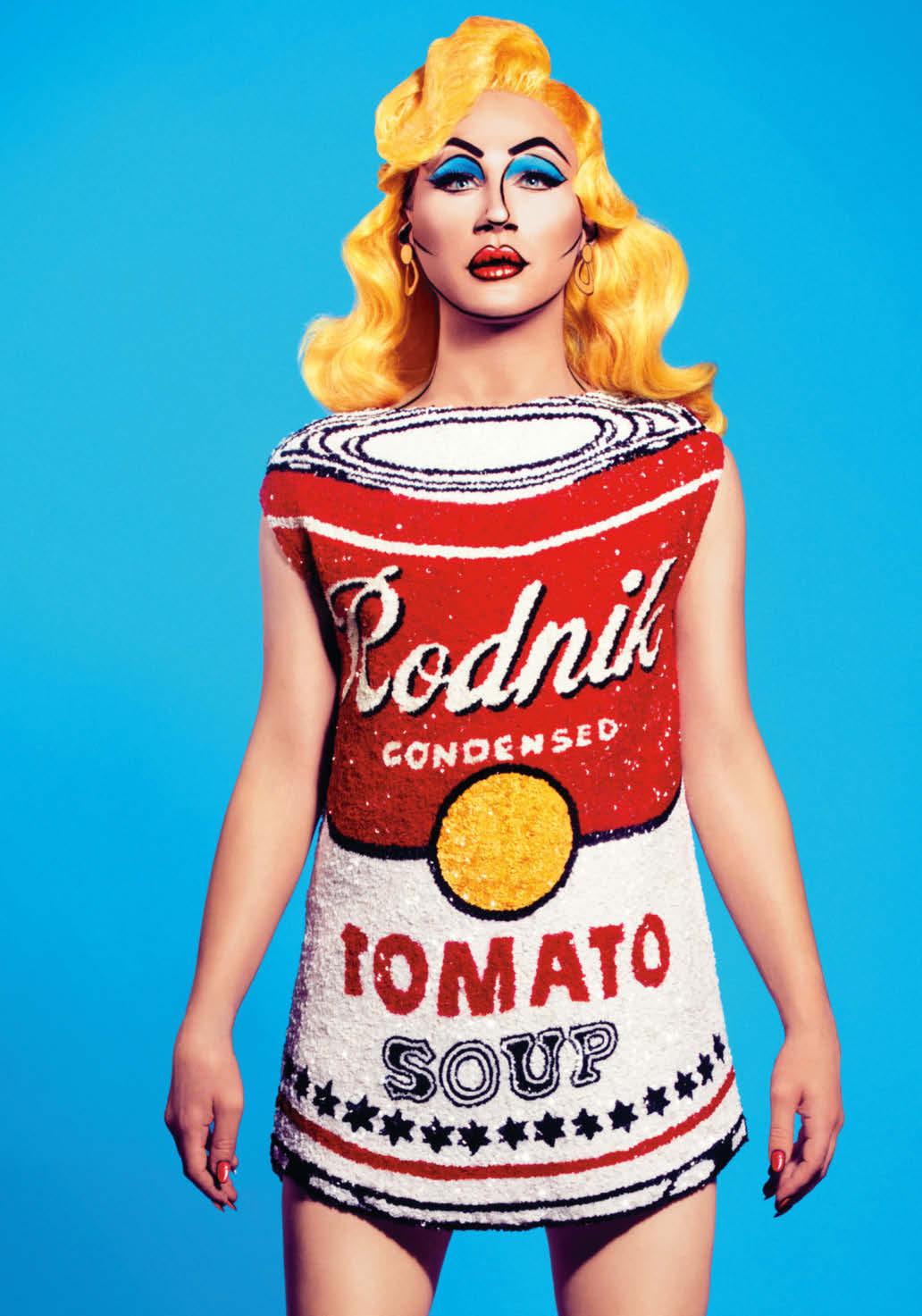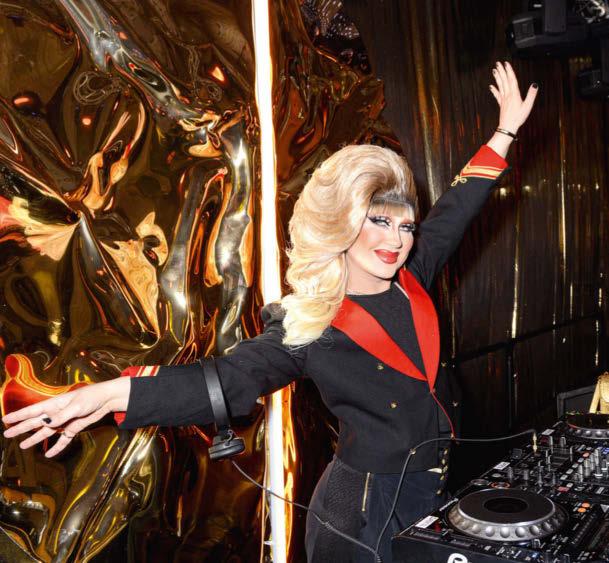
9 minute read
Life of the party
DJ, producer and songwriter Jodie Harsh found a home and happiness on the club scene as a teenager. Now she hopes her music can help others find the same thing, too
Words LOU BOYD Photography THOMAS KNIGHTS
Jodie Harsh is up for a party. The London-based DJ, music producer, songwriter and self-proclaimed “reigning Queen supreme over international nightlife” has been at the forefront of the UK’s club scene for the past two decades. A fixture at iconic noughties club Circus, and a gifted club DJ, over those 20 years Harsh has been pictured out on the town with everyone from Kate Moss and Paris Hilton to Lady Gaga and Amy Winehouse, and has gained a reputation as one of London’s happiest and most hedonistic party girls.
When clubs suddenly closed in 2020 at the start of the pandemic, however, Harsh’s day job and exhilarating lifestyle evaporated overnight. With a year of festival bookings, DJ gigs and public events cancelled, she made the choice to stay positive and focus on creating a party from home instead, making and releasing her own music for the first time. Her debut original single, My House, which dropped in November 2020, revealed that not only did Harsh have a musical talent away from the DJ decks but she had a sound that people loved. The beat- and hook-heavy track quickly totted up millions of streams online.
“People were stuck at home, missing the clubs and the fun,” Harsh says. “I like to think my track provided them with a bit of that feeling for a few minutes. It started getting played quite a bit on the radio, and it was nice to think that I was bringing some fun to people’s day during those months [in lockdown].”
Now, with further successful singles to her name, more music on the way, and an upcoming headline show in London on the horizon, Harsh spoke to The Red Bulletin about her experiences of the changing club scene since the early noughties, how finding a home on the scene was so crucial to her younger self, how she found her own sound, and why nightlife is such an important element of UK culture.
The Red Bulletin: Your music perfectly encapsulates the joy of being on the dancefloor. Is that something you consciously try to express with your sound?
Jodie Harsh: I’ve spent my life on the dancefloor, since I was 15, so I’ve always just been a fan of the happier side of music, like disco and funky house. Now more than ever, after what we’ve been through over the past few years, I think my mission statement in life is to provide a bit of an escape and a good time for other people through music.
Most of your career up until 2020 was club DJing and remixing other people’s tracks. What pushed you to focus on your own music?
The pandemic, I guess! My single My House came out halfway through the pandemic and blew up. That became my crossover moment. It sounds so silly and analytical, but that was the moment when I felt like my music went from being underground – just for the people already following me – to living in the real world outside my scene.
Can you remember when you first played your own music in a set?
Definitely. It was a terrace show at Night Tales in east London after the first lockdown. That was the first time I’d done a show that was just me and wasn’t attached to a club brand or to someone else’s show or a festival. It was just my name on it; people were coming to see me. When I played My House, everyone started singing along, and I just thought, “Wow, this is connecting.” Now, when people are at my events, they’re always singing my lyrics back at me. I never thought I’d get to experience that.
Tell us about your latest single, Hectic. How did that come about?
I’m really proud of it. I wanted to write a song about going out with your friends on a proper night out, and when we came up with Hectic I left the session thinking, “I don’t know whether that’s completely genius or if we’ll be leaving it on the cutting-room floor.” When I was in Australia last year, I heard loads of people constantly using the word hectic, and I thought, “Oh, that’s fun.” It reminded me a bit of Dizzee Rascal’s Bonkers.
A good night out should be hectic, right?
Oh, one hundred per cent. Good nights should always be hectic. I think that word summarises the happy chaos of when you’ve got the whole gang together and you’re going to a club. You’re glad to be together having fun, and it’s about pure escapism. It’s like, “Right, fuck it, we’re going out. Let’s go and have a good time.”
As well as launching your music career in 2020, you started your own podcast, Life of the Party What kind of conversations do you have on it?
We tell stories about nightclubbing and how it’s an important part of our culture. It’s great to hear stories of how people have met their loved ones and friends in clubs, and how clubbing developed their tastes, whether that’s music, clothes or even who they fancy.
Who have been your most memorable guests?
Nile Rogers was amazing. He’s one of my heroes. He was at [legendary ’70s/’80s New York nightclub] Studio 54, and it was amazing to hear those stories. And Fatboy Slim was great, of course. We also had Tom Daley on, who’s obviously a sportsperson and therefore hasn’t been really allowed to go out and let loose for much of his life. Also, Self Esteem was funny, because she doesn’t like going out, so we dissected why that is – I became her therapist for an hour.
What is it about going out and clubbing that's so important in your life?

GETTY IMAGES
Nightlife has always been about connection. It’s a moment to go out and forget about your very real life outside by going into a dark room, hearing the music you love and letting loose. It’s about meeting someone, it’s about kissing someone, it’s about finding your people and hanging out with your friends. It’s about sharing a moment and an experience. Sharing music and dancing together.
A place of belonging?
Exactly. I remember walking into a club for the first time. I was very young – 15, about to turn 16 – with an excellent fake ID, and for the first time I saw all these people who were like me. Growing up as a little queer boy, I felt different and disconnected from other people. When I stood in a nightclub for the first time, hearing the music I love, among thousands of people I could identify with… for the first time in my life, I felt like I was home. Life experiences happen in nightclubs. You learn about yourself from those rooms with their lights out. Those loud, dark rooms have always been very, very important.
What’s your opinion of the club scene in London today?
People love to complain about the state of clubs, but I think it’s probably always been that way. If you went back to the amazing clubbing heydays of the ’80s and the ’90s, I’m sure that people then were complaining about how all the best places had already gone. Maybe we never appreciate what we’ve got till it’s gone. Personally, I think there’s loads going on. Just look at my corner of the nightclubbing landscape: queer clubs. Really exciting things are happening at places like [north London club] Adonis, for example – you see thousands of people pouring out of those nights, and it’s hard to get in.
Do you see a change now from how clubs were before the pandemic?
Venues have closed, and that is, of course, really awful. But things die and other things are born – that’s just the way of art and of life, isn’t it? There’s still so much on offer, especially if you travel around different parts of the country. There are whole new scenes starting, and they’re growing so fast. In times of struggle – especially now when we’re all struggling financially –clubs will become more DIY again. I think things are maybe going back to the source a little more.
Tell us about your headline show at The Outernet in London. Will you be playing your own music?
It’ll be a visual live show playing all my music, everything I’ve released, and probably some extra bits I’m working on. I really enjoy marrying the visual side of what I do with the musical. I’ve always liked artists who do that, whether it’s Grace Jones back in the day with her one-woman show, or Madonna’s best tours. I want the show to feel like a 360-degree experience. It's kind of boring when it’s just a DJ playing music – I really enjoy extra elements like big sets, massive LED screens and dancers. It’s my biggest-ever headline show. Exciting, but also a lot of pressure!
What are your aims for this year?
To bring music to more ears and bring a bit of happiness to people. Whether it’s a DJ set for 90 minutes or a three-minute tune on the radio, I just want to help to bring a little bit of extra joy into people’s day or night. That’s what I’m here for, I think.
Jodie Harsh’s headline show takes place at The Outernet in London on April 15; jodieharsh.com


